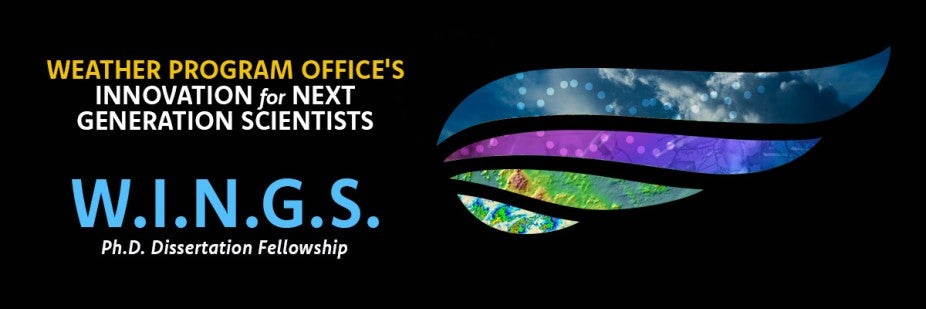Weather Program Office (WPO) Innovation for Next Generation Scientists (WINGS) Dissertation Fellowship

Gain real-world doctoral experience applying expertise in your field of study to weather model development with the NOAA Weather Program Office's (WPO) Earth Prediction Innovation Center (EPIC) and Joint Transfer Technology Initiative (JTTI) programs.
Unfortunately, we will not be taking program applications for 2026.
Program Overview
Weather Program Office (WPO) Innovation for Next Generation Scientists
(WINGS) PhD Dissertation Fellowship
The WINGS PhD Dissertation Fellowship, supported by NOAA’s Weather Program Office (WPO) and administered by UCAR’s Cooperative Programs for the Advancement of Earth System Science (CPAESS), will develop and foster the next generation of science, technology, engineering, and mathematics (STEM) scholars, with the goal of bolstering the future workforce of America’s Weather Enterprise.
The WINGS Fellowship is designed for PhD candidates who have completed their required coursework and are in the beginning stages of writing a dissertation. Fellows will work with their academic advisor and a mentor recommended by WPO and CPAESS, to provide guidance during the dissertation process. The focus of this Fellowship is on research relevant to the NOAA WPO's Earth Prediction Innovation Center (EPIC) and Joint Transfer Technology Initiative (JTTI) programs. This focus will serve as a catalyst for community research and modeling system advances that continually inform and accelerate improvements in the Unified Forecast System (UFS), spanning local to global domains and predictive timescales from sub-hourly analyses to seasonal predictions.
The first year of the WINGS Fellowship (2023) was a pilot focused on scientific outcomes related to the EPIC program, which aims to improve operational weather and climate forecast systems through scientific and technical innovation via model co-development with the weather enterprise. Future Fellowship years will explore other aspects of the WPO's research. "In pursuit of its vision and mission, WPO works closely with the National Weather Service (NWS) to help develop and transition weather research, including hurricanes, severe thunderstorms, heavy precipitation, and air pollution. Additionally, the WPO utilizes social science to learn how to deal with the uncertainties weather presents and to inform its engagement and communication with researchers, funders, and the public."
The 2025 WINGS Dissertation Fellowship will be awarded for two years with a potential extension if approved. WINGS Fellows will be UCAR employees and will receive funding for 0.5 FTE for 9 months and 1.0 FTE for 3 months, including benefits (1,320 hours per year at an hourly salary of $27.58)*, and limited tuition support**. WINGS fellows will also receive an annual travel allowance of $5,000***.
The WINGS program will enable Fellows to gain insights into their respective fields of study, support the Fellows’ integration into the workforce, and offer a unique opportunity to contribute to forecast model development. Potential topics for the Fellowship this year can focus on one or more areas of scientific and/or technical importance shared by UCAR, EPIC, and JTTI including:
- Data Assimilation
- Atmospheric Physics
- Systems Architecture (coupling, workflow, continuous integration and development)
- Machine Learning/Artificial Intelligence
- Software Engineering to advance numerical weather prediction
Please find more information and application instructions here. Application intake for 2025 is closed.
Do you have questions? Please reach out to Cindy Brueyère (bruyerec@ucar.edu).
* If the student utilizes the maximum number of hours in the fellowship, the total salary will amount to at least $36,406.
** UCAR may be able to provide limited tuition support. Candidates are encouraged to seek "Cost-Matching" tuition support from their universities before applying.
*** A mandatory trip to attend the annual UIFCW workshop is included in this allowance.